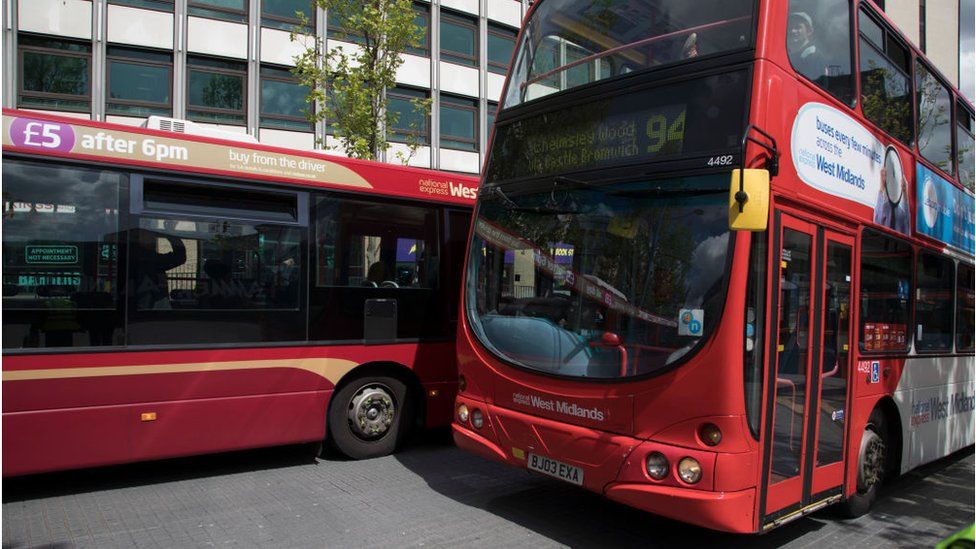
By Katy Austin
Transport correspondent
More cuts to bus services could be on the way in April when government support for the sector is due to end, an industry group has warned.
The Confederation of Passenger Transport said it still faces struggling passenger numbers and soaring fuel and wage bills.
“Sometimes there is no alternative” to withdrawing services completely, its boss Graham Vidler said.
It comes as a £2 fare cap is being introduced in a bid to boost ridership.
From 1 January, a temporary cap will be in place on many single local bus journeys around England (outside of London), as part of a government-funded scheme which will last for three months.
Currently the average cost for a single journey for an adult is £2.80, but can exceed £5 in rural areas, the government says.
But even with the introduction of the scheme and emergency funding during the pandemic, bus companies say some routes simply do not have enough demand to justify keeping them running.
“Our costs are up about 25%, through rising fuel prices, and the rising cost of living – which is feeding through in to the amount we need to pay our drivers,” Mr Vidler told the BBC.
“At the same time, passenger numbers are down considerably.”
Mr Vidler estimates the industry “would need about £250m to plug a shortfall in the next financial year” as a result, but acknowledges that would be far less than the cash needed to stem shortfalls in the rail sector.
About half of journeys on public transport in England are made on buses, according to the Department for Transport.
‘Daily’ complaints about cuts
But campaigners say cuts to timetables means many are frustrated by limited bus routes – and are using cars instead.
Alice Ridley, of the charity organisation Campaign for Better Transport, says timetables are an issue across the country.
Complaints about cut or changes bus routes are received on an almost daily basis, says campaigner Alice Ridley
Ms Ridley says nearly every day she hears about bus routes which have been amended or withdrawn.
Recent research by the charity suggested bus services have been cut by a quarter in the last decade.
“Unless there is more funding, we will see even more cuts,” she said.
Cuts to local bus services in the north-west of Sheffield, for example, have prompted some local people to say there are no longer enough routes operating to serve the community’s needs.
Sheffield resident Graham Jones says more locals are turning to cars as bus routes in the area are reduced
“A lot of the routes have been cut – and even if you look at the timetable for the reduced services – the buses often just don’t turn up,” Graham Jones, a bus campaigner in Sheffield, said.
“People are missing appointments as a result, can’t get to church – and a lot more are using their cars.”
Some areas in Sheffield have already brought in the £2 temporary fare in a bid to attract more passengers.
Buses Minister Richard Holden told the BBC that the government has already invested millions in supporting bus services. He hopes temporarily capping single fares will encourage more people back onto buses.
“What I want to see is a reliable service for the future, which is also affordable for people to use,” he said.
“If we do not get that ridership back on, all we are doing is paying hundreds of millions of pounds more in subsidy. What I’d like to see is that money going towards actually delivering services,” he added.
Have you been affected by the issues raised in this story? Share your experiences by emailing haveyoursay@bbc.co.uk.
Please include a contact number if you are willing to speak to a BBC journalist. You can also get in touch in the following ways:
If you are reading this page and can’t see the form you will need to visit the mobile version of the BBC website to submit your question or comment or you can email us at HaveYourSay@bbc.co.uk. Please include your name, age and location with any submission.

